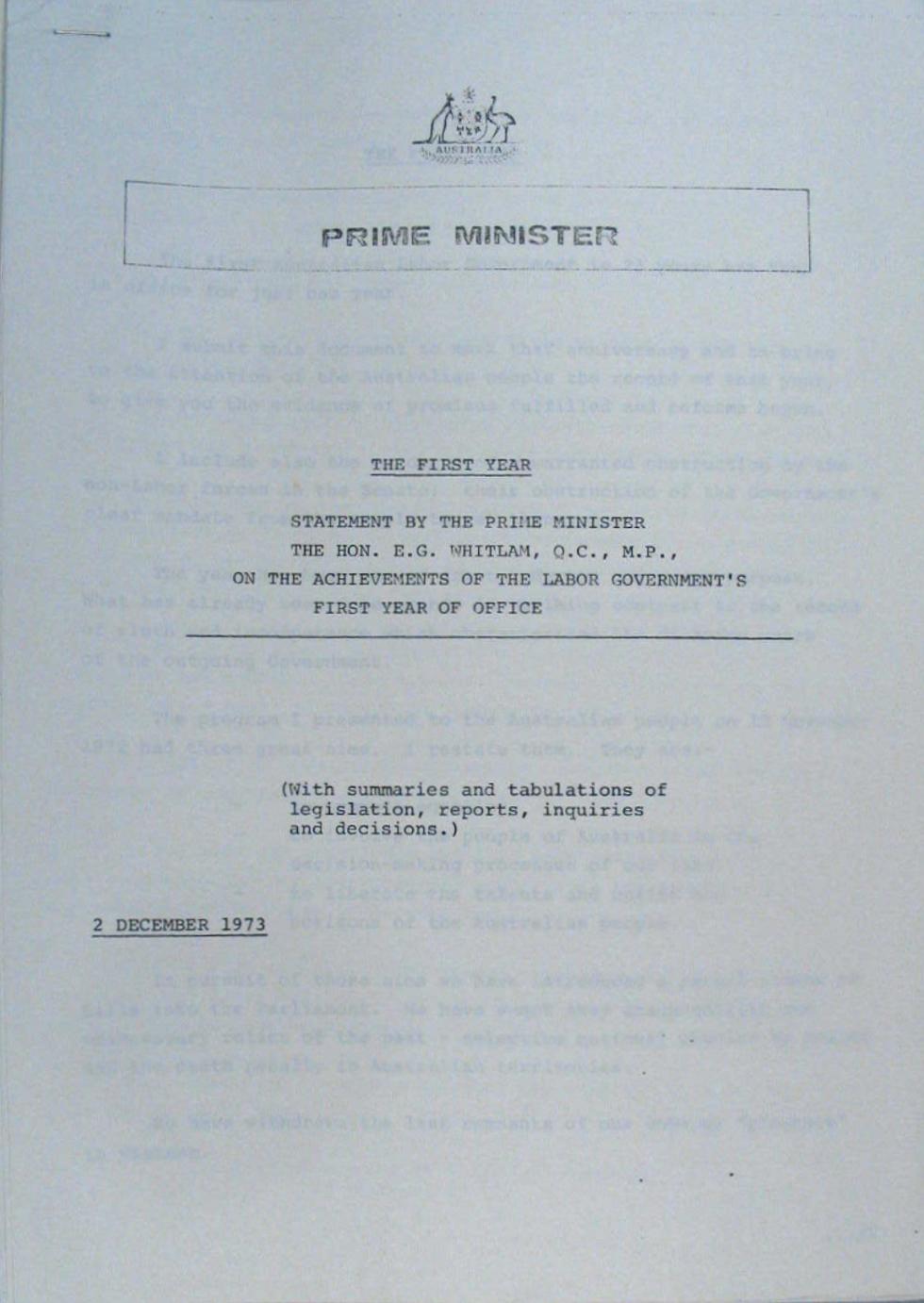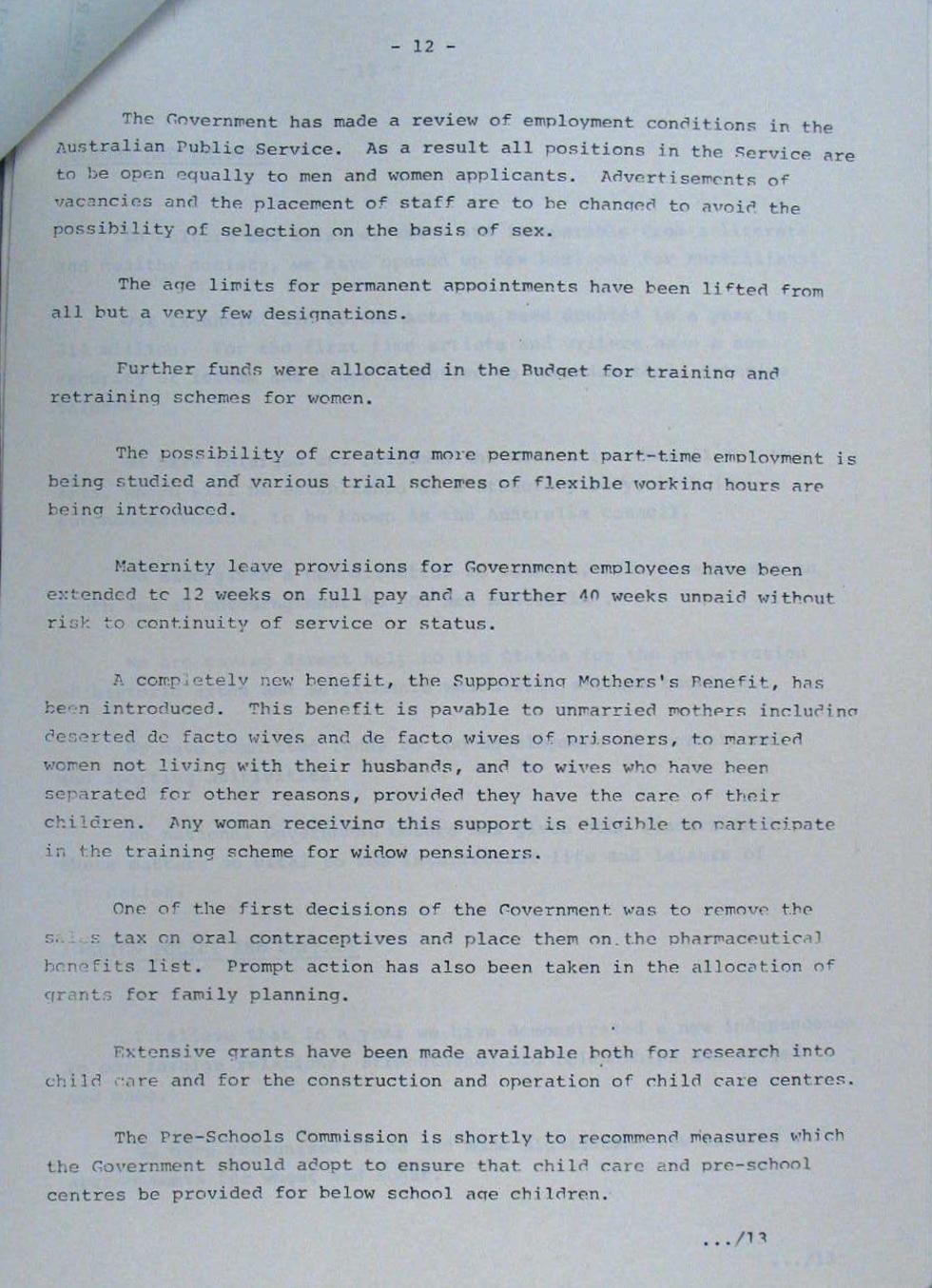



Aboriginal and Torres Strait Islander people should be aware that the National Archives' website and collection contain the names, images and voices of people who have died.
Some records include terms and views that are not appropriate today. They reflect the period in which they were created and are not the views of the National Archives.





[Page 1.]
[staple in top left corner.]
[Australian coat of arms.]
[Capitalised, large font:] Prime Minister
[underlined] THE FIRST YEAR
STATEMENT BY THE PRIME MINISTER
THE HON. E. G. WHITLAM, Q.C., M.P.,
ON THE ACHIEVEMENTS OF THE LABOR GOVERNMENT'
FIRST YEAR OF OFFICE
[dividing line.]
(With Summaries and tabulations of legislation, reports, inquiries and decisions.)
[Underlined] 2 December 1973
[Page 2.]
[underlined] THE FIRST YEAR
The first Australian Labor Government in 23 years has been in office for just one year.
I submit this document to mark that anniversary and to bring to the attention of the Australian people the record of that year, to give you the evidence of promises fulfilled and reforms begun.
I include also the evidence of unwarranted obstruction by the non-Labor forces in the Senate; their obstruction of the Government's clear mandate from the people to get things done.
The year has been one of great industry and great purpose. What has already been done stands in striking contrast to the record of sloth and incompetence which characterised the decaying years of the outgoing Government.
The program I presented to the Australian people on 13 November 1972 had three great aims. I restate them. They are:-
To promote equality
To involve the people of Australia in the decision-making processes of our land
To liberate the talents and uplift the horizons of the Australian people.
In pursuit if those aims we have introduced a record number of bills into the Parliament. We have swept away anachronistic and unnecessary relics of the past – selective national service by ballot and the death penalty in Australian territories.
We have withdrawn the last remnants of our unhappy "presence" in Vietnam.
…/2
[Page 3.]
-11-
[underlined] HUMAN RIGHTS:
This Government is committed to taking all possible legislative and administrative action to prevent discrimination on the grounds of colour, race, sex, language, religion, political or other opinion, national or social origin, property, birth or other status.
We have made this commitment clear in regard to our aboriginal citizens. We have eliminated all racial implications from our immigration policies.
We have made it clear to other Governments by our early decision – six days after the election – to exclude racially-selected sporting teams from Australia.
We are pledged to appoint an ombudsman. We have already appointed an ombudsman for the armed services.
In the wider context, we have enshrined these principles in legislation. Two complimentary bills – one on Human Rights and the other on Racial Discrimination – are now before the Parliament.
[underlined] WOMEN
The Australian Government is able, and therefore bound to remove, or reduce many aspects of legal, social, educational, and economic discrimination against women. We are trying to do so.
In June this year the Government ratified a basic ILO Convention on discrimination in employment and occupation which will be of benefit to women. It is also committed to ratify the ILO Convention on equal pay for women.
The Human Rights Bill which has been introduced is a further step in the direction of reducing discrimination.
[Page 4.]
- 12 -
The Government has made a review of employment conditions in the Australian Public Service. As a result all positions in the Service are to be open equally to men and women applicants. Advertisements of vacancies and the placement of staff are to be changed to avoid the possibility of selection on the basis of sex.
The age limits for permanent appointments have been lifted from all but a very few designations.
Further funds were allocated in the Budget for training and retraining schemes for women.
The possibility of creating more permanent part-time employment is being studied and various trial schemes of flexible working hours are being introduced.
Maternity leave provisions for Government employees have been extended to 12 weeks on full pay and a further 40 weeks unpaid without risk to continuity of service or status.
A completely new benefit, the Supporting Mothers's [sic] Benefit, has been introduced. This benefit is payable to unmarried mothers including deserted de facto wives and de facto wives of prisoners, to married women not living with their husbands, and to wives who have been separated for other reasons, provided they have the care if their children. Any women receiving this support is eligible to participate in the training scheme for widow pensioners.
One of the first decisions of the Government was to remove the sales tax on oral contraceptives and place them on the pharmaceutical benefits list. Prompt action has also been taken in the allocation of grants for family planning.
Extensive grants have been made available both for research into child care and for the construction and operation of child care centres.
The Pre-Schools Commission is shortly to recommend measures which the Government should adopt to ensure that child care and pre-school centres be provided for below school age children.
…/13
This document, written by Gough Whitlam, outlines the Whitlam Government’s achievements in the areas of human rights and women’s rights after their first year in government. This record demonstrates the ambitious policy program of the Whitlam Government.
In 1972 Gough Whitlam became Prime Minister, ending 23 years of conservative government. His time as leader of the Labor Party between 1967 and 1977 coincided with a period of immense social change. The generation born after World War II became adults and became politically active on issues such as the war in Vietnam, Aboriginal land rights and women’s rights.
In this document Whitlam restates his government’s ‘three great aims’, announced during the election campaign: ‘to promote equality’; ‘to involve the people of Australia in the decision-making processes of our land’; and ‘to liberate the talents and uplift the horizons of the Australian people’. Addressing barriers to women’s advancement aligned with all three of these aims.
In 1971 women experienced high levels of discrimination in the workplace and lacked autonomy in their personal lives. Women received only 75 per cent of the male wage and many positions, particularly supervisory roles, were reserved for men.
The Whitlam Government sought to eliminate this discrimination, including by amending legislation governing the Commonwealth Public Service to remove discrimination from new vacancies. They also lobbied the Conciliation and Arbitration Committee to review the National Wage Case and to implement equal pay for work of equal value, irrespective of gender. This occurred and led to over half a million women receiving approximately 30 percent more pay.
The Whitlam Government set an example for other employers by passing legislation to allow female Commonwealth Public Service employees access to twelve months maternity leave, including three months of leave on full pay. This demonstrated a significant shift in attitudes to female workers who had been forced to resign after marriage up until 1966. Female participation in the workforce was further supported by the Whitlam Government’s provision of grants to not-for-profit childcare services and funding for training programs specifically targeted at women.
The Whitlam Government made contraception more accessible. This included removing the sales tax on the contraceptive pill and placing ‘the Pill’ on the Pharmaceutical Benefits Schedule, which reduced the cost to about $1 a month in 1972. Whilst the contraceptive pill had been available in Australia from 1961, many people, including doctors, did not agree with its use, due to their religious beliefs. Making this form of contraception more accessible gave women greater control to decide when, and if, they wanted to have children.
The Whitlam Government also introduced the Single Mother’s Benefit, which included payments to single mothers. Previously, many single mothers had been forced to relinquish their children to adoption. This measure gave single mothers the ability to independently care for their children.
These changes highlight the Whitlam Government’s first year in office. In the following two years the Whitlam Government would continue to make lasting changes that would forever transform the lives of women in Australia.
Learn how to interpret primary sources, use our collection and more.
